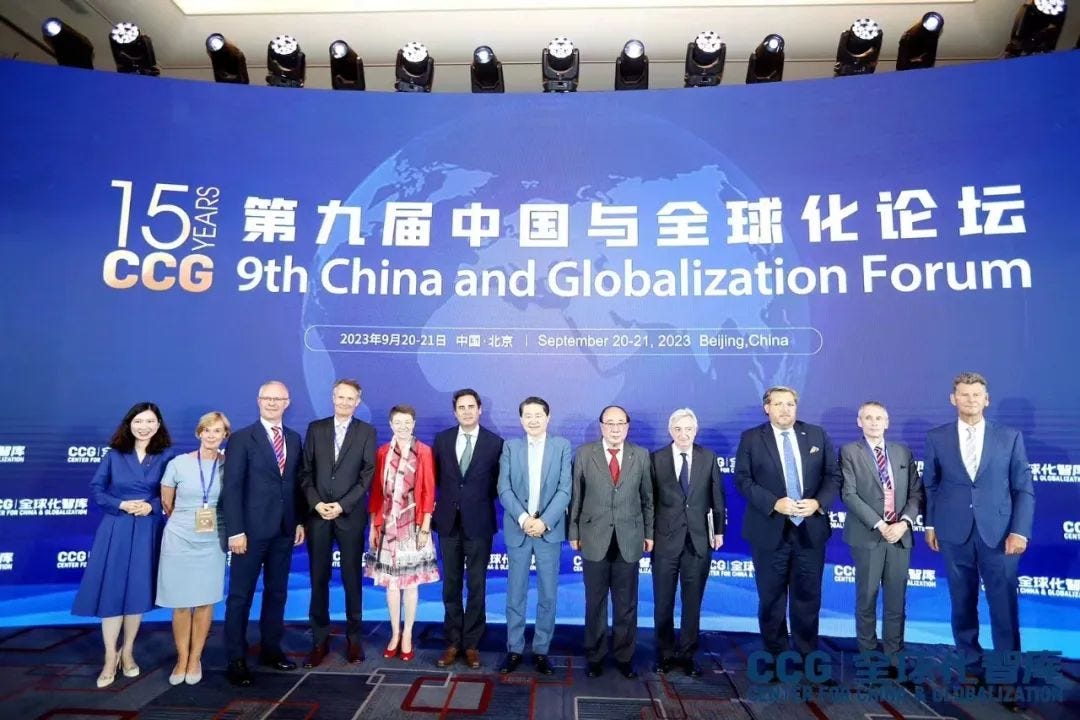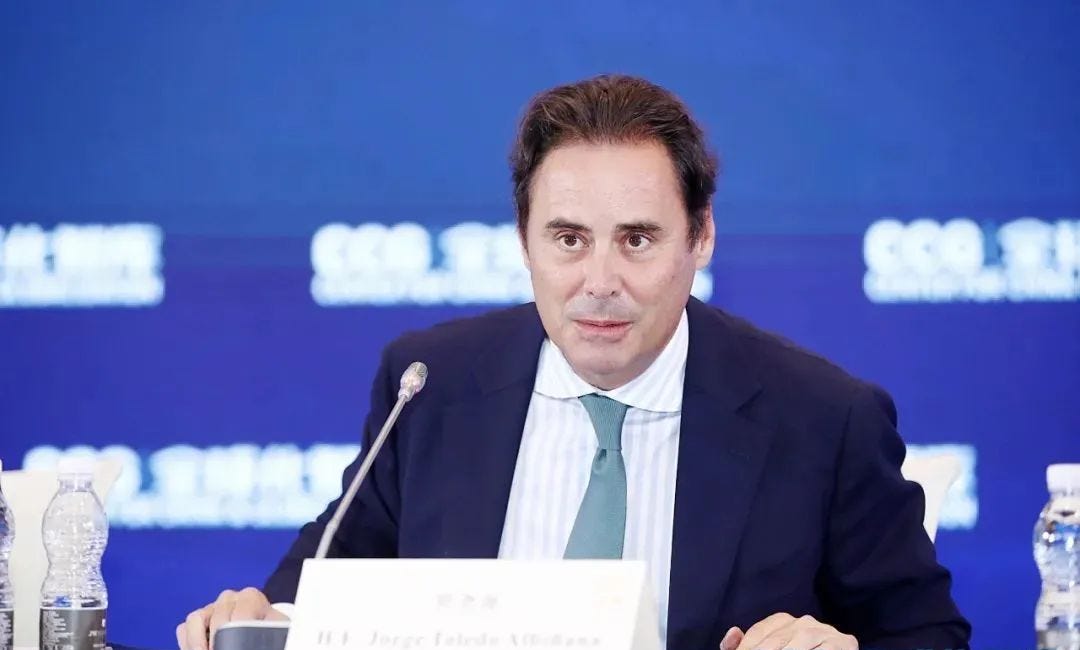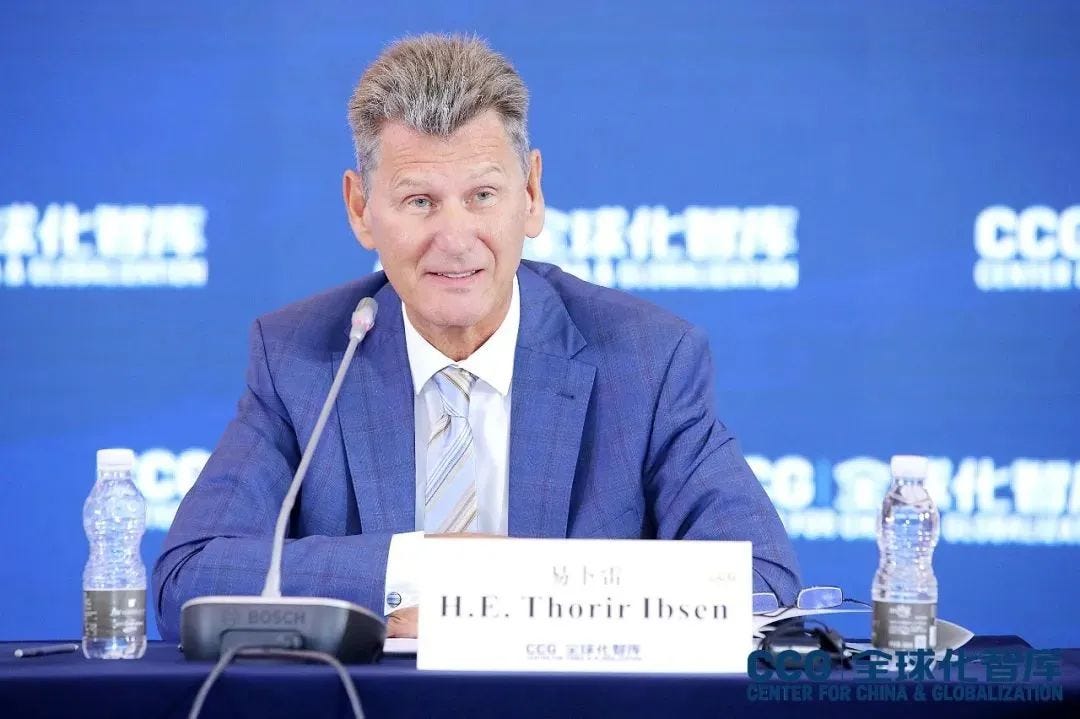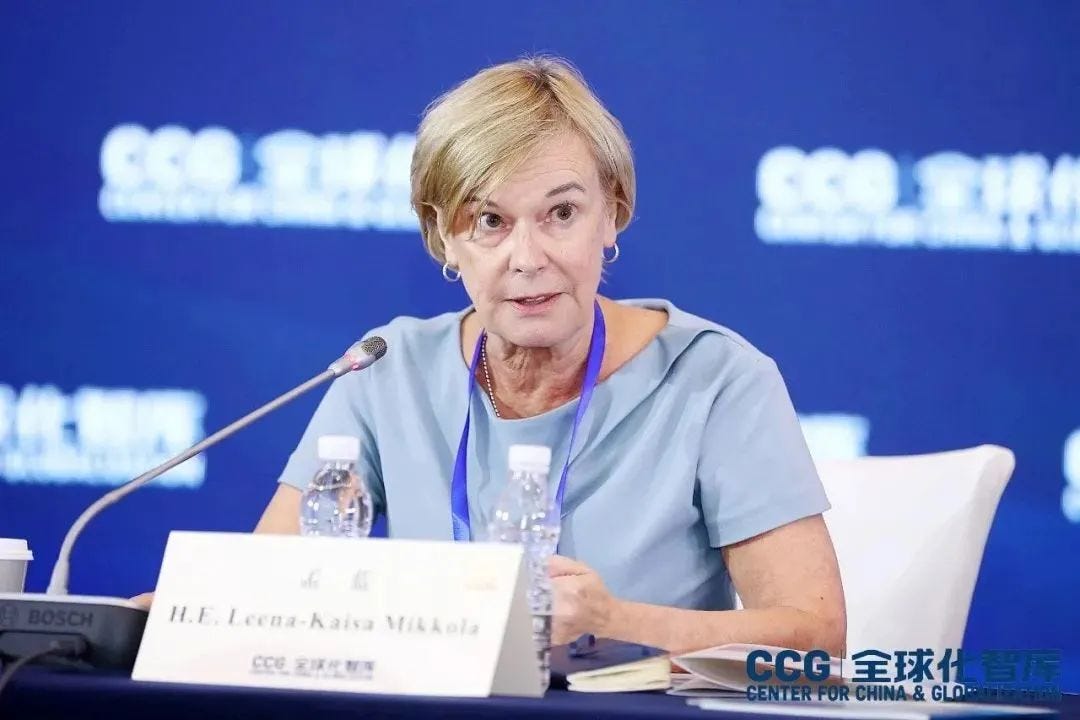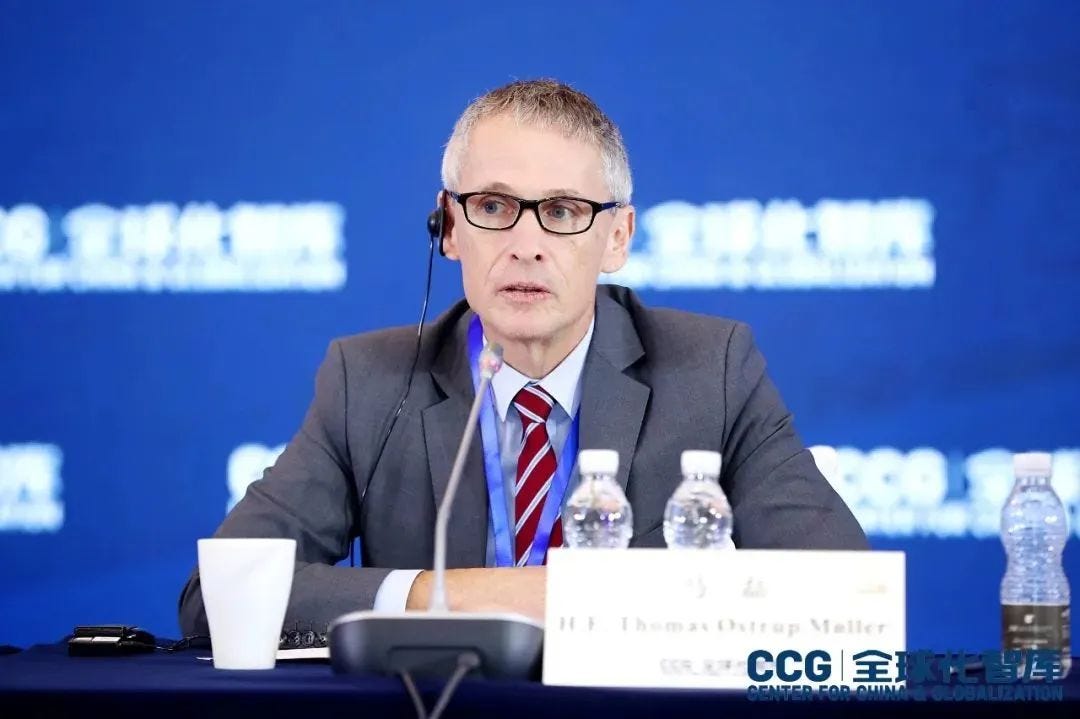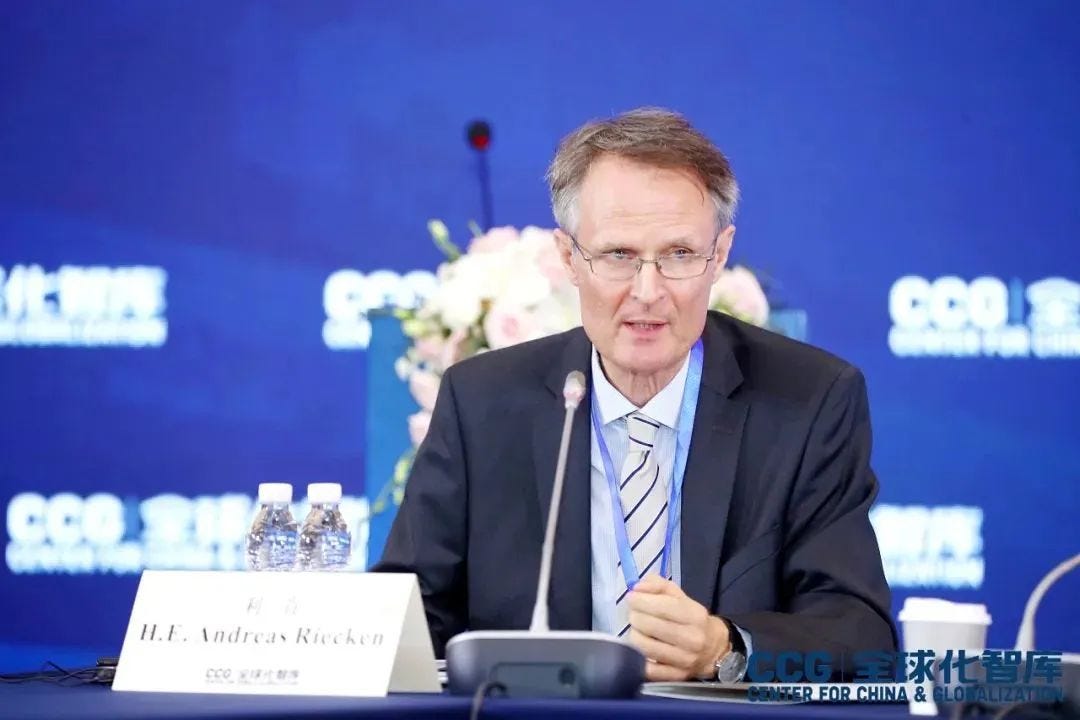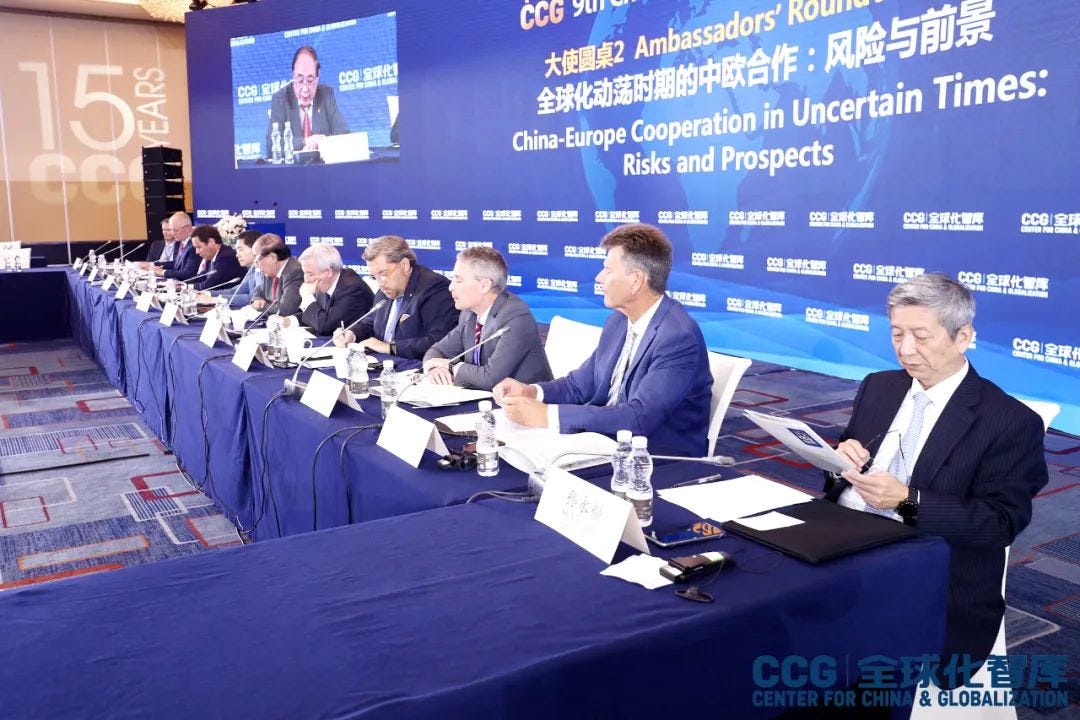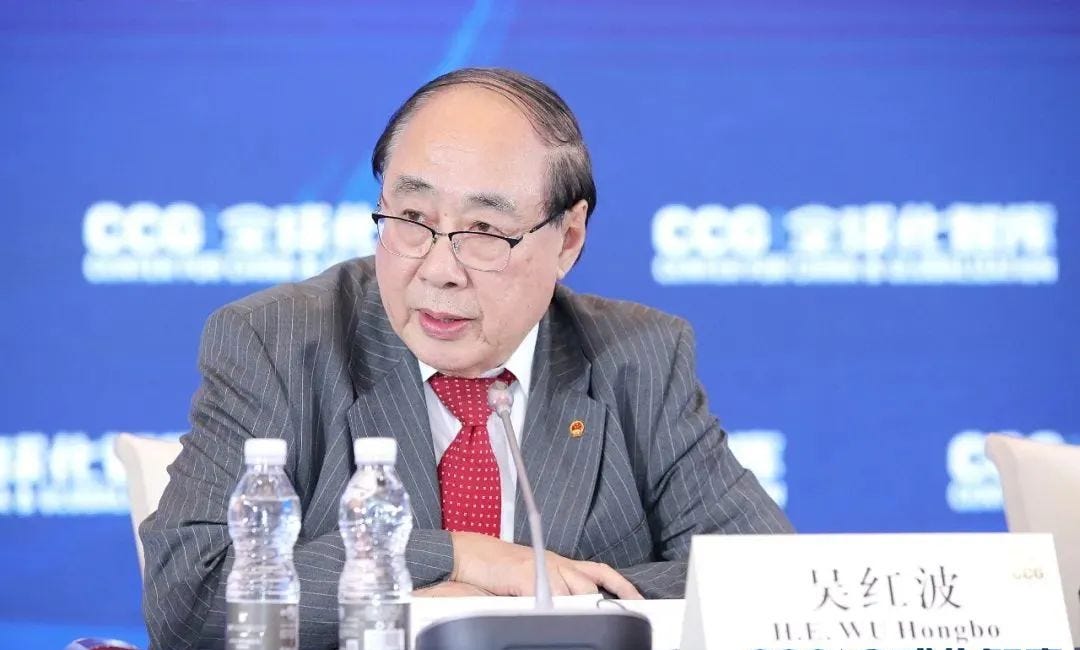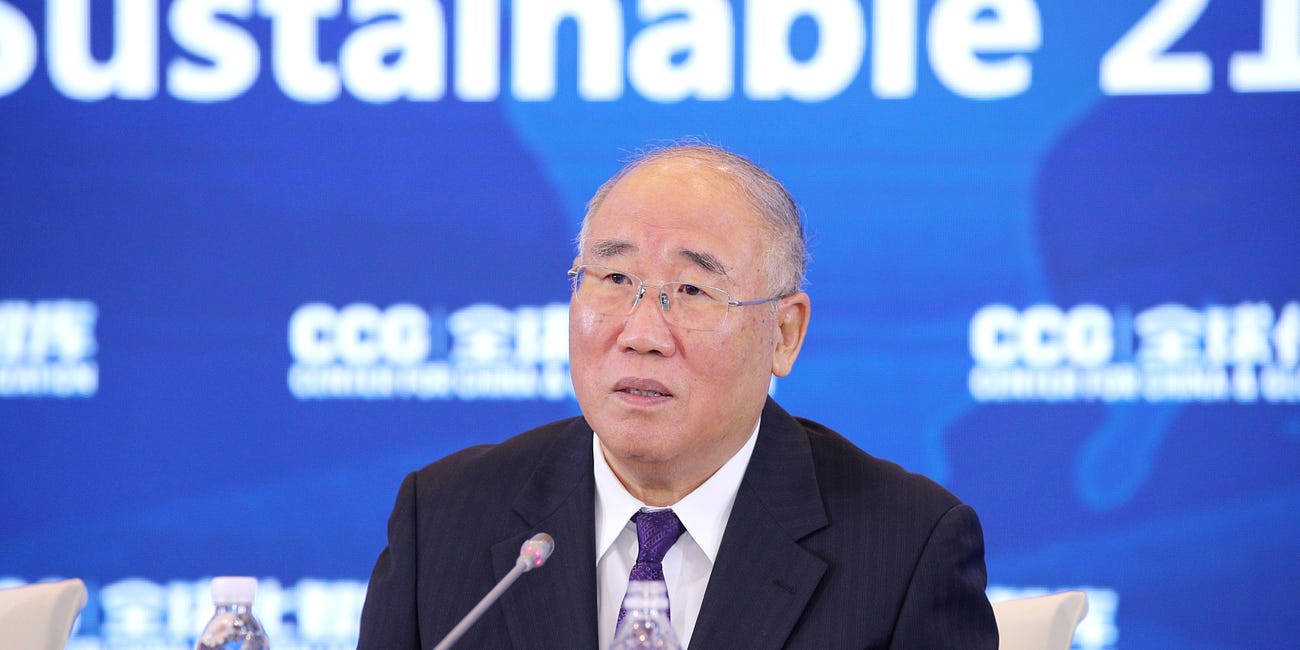Intervention by four European ambassadors at CCG's China and Globalization Forum
Icelandic, Finnish, Danish, and Austrian ambassadors reiterate support for Ukraine, inclination for economic security, and expectation for a collaborative China-EU approach to global challenges.
On September 21, 2023, Wu Hongbo, Special Representative of the Chinese Government for European Affairs, engaged in an in-depth dialogue with a group of European ambassadors in China, as well as Sun Yongfu, former Director-General of the Department of European Affairs, Ministry of Commerce in China.
This was part of the 9th China and Globalization Forum hosted by CCG, which also celebrated CCG's 15th anniversary.
CCG Update has already published the speech and Q&A by Special Representative Wu Hongbo, the initial portion of the ambassadors's speech in addition to remarks by Sun Yongfu, former Director-General of the Department of European Affairs, Ministry of Commerce in China. Today's second installment presents the remaining speeches delivered by ambassadors of Iceland, Finland, Denmark, and Austria. Please note that the following texts are transcripts of live recordings and have not undergone review by the respective speakers or their staff.
Thórir Ibsen, Ambassador of Iceland to China
I'm particular as the only non-EU European country in the panel, and particularly I’m appreciative that you have the title "China-Europe Relations", and I thank you very much for that.
At the beginning, I want to stress that Iceland and China have very good bilateral relations—they have had that for a very long time. And as we were speaking about climate change, climate action, and renewable energy earlier this morning, I would like to note in that context the unique and successful cooperation of Iceland and China in bringing the use of geothermal energy to China. This has taken 40 years of cooperation, it has been very successful. Today, an Icelandic entity, in cooperation with a Chinese entity, has developed and built the largest geothermal district heating service in the world in China, servicing 70 cities and counties.
Now, why is this important? That's because 40% to 50% of carbon emissions come from house heating and house cooling. This cooperation is now being extended to cooling activities. We've also been training Chinese experts in using geothermal energy, and they are now the backbone of the geothermal industry in China. And now we are bringing in the new technology of CCUS on an industrial basis and working with the Chinese industries. I was very pleased to see how much China appreciated this cooperation last weekend at the 2023 World Geothermal Congress that was held here in Beijing.
Now, considering that we have been having this very good cooperation, we of course want to continue good cooperation with China into the future. And we welcome the very positive outreach of China and Europe. It helps rebuilding connections and the dialogue.
Our stand is, of course, of the general view, along with my European colleagues, that we do indeed want to cooperate with China within the existing international, legal, and institutional framework. But as always, when it comes to to good cooperation and good relationship, we also have to address what are the difficult issues. We cannot only talk about what is good, we also have to address what's difficult and how we can resolve these issues and move forward. And I'd like to raise two important issues that are related to issues also raised by my colleagues from the European Union.
And evidently the first issue is the Russian aggressive war in Ukraine. As my colleagues have said, this is, of course, an existential threat to all of us in Europe and has a major impact on the global economy. And Russia has to be stopped. And China, as a P5 country, has the responsibility to uphold the UN Charter and condemn Russia for the war of aggression and deny it of any assistance. There is no notion in international law of legitimate security interest that can justify military intervention in another country. Now, China shares with Europe and shares with us the commitment to an unconditional respect of sovereignty and territorial integrity of independent states as a fundamental rule of international law. And I would like to mention it to this respect that last spring in March, Iceland hosted all the leaders of the European Council. And 44 leaders of 44 countries of Europe agreed there to establish a register of damage caused by the Russian Federation's aggression as a first step towards an international compensation mechanism.
Moving to the other concern, an issue that we need to address is our trade relations. Now they have been somewhat paradoxical over the past few years. Iceland is fortunate to have a bilateral free trade agreement with China that we are celebrating the ten years of the signature this year. And that has been a very good, good relationship that has developed from that free trade agreement and to the mutual benefit of both. Over the past two to three years, in 2021 and 22, the interesting thing is that during the COVID time, we had record years in terms of exports to China and in terms of trade value between the two countries. And it looks like that we're going to go in the same direction in this year, 2023. We've also have benefited very much from tourists from China that flocked to Iceland before COVID, and the numbers are up to the same level now after Chinese students started to leave the country in the beginning of the year.
But at the same time, our companies, and probably applies to all European countries, if not, all international companies dealing with the Chinese economy during the past two to three years, we have never experienced as many complexities and difficulties and losses in our trade with China. And this is something that we hope that China will address and move on to resolve. Because companies, they rely on predictable rules, and there's nothing that business dislikes more than uncertainty. It is important that China continues to ensure stable and predictable market conditions, fully respectable to your rules, and show a transparent and predictable regulatory framework, and simplify customs registrations and procedures. This is, I'll conclude, my intervention. Thank you very much, everyone.
Leena-Kaisa Mikkola, Ambassador of Finland to China
Thank you very much, Henry. And I salute a CCG of organizing this event, and also the previous events during Covid pandemic, when actually you were the ones giving us great opportunity for exchange of view. So thanks for that. And as I'm a Fin, I try to be very short, and I put my wristwatch here to obey the time limits.
Many things have been said by our European colleagues, so I do not want to repeat them. But let’s say that all these important topics have been tackled here: what we need to do together climate change, biodiversity, new technology issues, open trade, open economy. I would then also want to emphasize what the Ambassador Wu Hongbo said about peace and security, multilateralism. I couldn't agree more with him, and I think the EU is very eager to work together with China on issues of global security, peace and security. And we appreciated your comments very much.
Also, I want to add, and this is the last topic, and nobody will be surprised what it is: that I have appreciated very much the many occasions I have had in discussing the war in Ukraine with our Chinese hosts. We also appreciate very much the important fact that China is taking part in the wider international discussions on Ukraine, like in Jeddah. But the truth remains that more than a year and a half, we use a very different vocabulary, and we talk about very different things when discussing Ukraine, which means that we see the situation differently. We define Russia's actions in Ukraine as war. For us, it's hard to see how else to describe it with all the human suffering, lost lives, lost infrastructure, occupation, annexation, and the fact that there is a clear military aggressor in all this. China still prefers to call it crisis. There are also deep differences when it comes to the root cause of the war. China’s recently published proposal on the reform and development of global governance—there is an important chapter also on Ukraine. Many things we agree. However, we beg to differ when it comes to some of the conclusions, perhaps in particular, the root cause of the crisis lies in "the problem of security governance in Europe". So this was the quote of this newly published proposal.
For us Europeans, as we have often explained here, the aggression by Russia broke the existing structures and the existing trust. And my case, Finland is a case in points in this. So for us, the reason for this aggression is more Russia's ambition to shrink, if not to deny, the sovereignty and territorial integrity of Ukraine. In China, we are often here to talk about the irresponsibility of adding fuel to fire, that my Estonian friend also mentioned. This is also added in the new proposal on the Global Governance Reform and Development. But for us in Europe, this formulation and vocabulary is kind of hard to accept, while we know that what you mean by not adding fuel to fire would in effect deny Ukraine the aid and support that they need to defend themselves. My president yesterday, in the UN speech, he underlined that bringing the war to a just end is essential for Ukraine, but might also help to lower attentions on a wider scale. This would benefit the whole world. But to succeed in this, the end must be just.
So we Europeans and our good friends here, we see the root causes, the form, and the reality of this issues—that's crisis, that's conflicts, that's war, and probably also the concept of self defense, differently from you here in China. Yet we sincerely want to engage with China on Ukraine. I've heard many times here that "you Europeans are so emotional when it comes to Ukraine." Well, war is something to be emotional about. But at the same time, I think we are very clear eyed on what's going on. For us, it is existential, as many colleagues here have mentioned. Thank you very much.
Thomas Østrup Møller, Ambassador of Denmark to China
Thank you so much to CCG for convening us here today. It's really useful. The problem, of course, of being so at the end of the speakers list is that I, Mr. Riecken, and Mr, Sun are the only ones who are behind between you and their buffet. So I will try to speed up.
China and the European Union are among the world’s great powers, and that goes for in terms of economy, in terms of politics and and this, of course, this comes with great responsibility. And right now, we are facing many global challenges: biodiversity, water resources, global health, poverty, pollution, and environment on land and in the oceans, waste, recycling…I could go on. International cooperation on these issues are absolutely necessary. Climate change, of course, is at the very top of the agenda, and it should be all over the world, including in China and in Europe. The extreme weather situation, conditions of this year is a troubling reminder to all of us that climate change is real and requires action right now, not tomorrow, but today.
There's so much more China and Europe can and need to do together on on climate. But we also need to work in the same direction when it comes to our economic and trade relations. Our economies, business, supply chains, are closely interlinked, and we benefit greatly from this. But being so heavily interlinked will also give rise to some frictions. Denmark is a small, open economy. We are a large proponent of free trade and globalization. It has brought wealth to Denmark, to the EU, to China. But the world of today is entering into what we might call Globalization 2.0, an updated kind of globalization that hopefully will contain fewer floors. The term "economic security" is gaining ground across the globe these days. Resilience, or derisking, could be other words labeled on this situation.
In China, it has been, as pointed out by my Spanish colleague, it has been sort of manifesting itself on the headlines like China 2025, self-sufficiency and dual circulation. In Europe. Now, there is also a growing understanding that societies should try to safeguard themselves against a certain kind of market failures.
And to me, there are two world events that makes it quite clear why we have to make these deliberations and considerations. The first one is, of course, Russia's invasion of Ukraine, which has transgressed all the basic principles we believe in Europe, and I believe everywhere, those of us who are adhering to the UN Charter. The EU also left itself far too dependent on Russian energy, in particular natural gas. In addition, grain exports are being held hostage, pushing people in need to the brink of their survival. Then there's the the COVID pandemic. We all experienced that critical goods, or industry inputs were no longer able to be delivered, produced or shipped around the world, raising cost of putting economies and societies at risk. And both events have shown the cost or pitfalls of being reliant on something akin to supply chain monopolies.
As societies, we must guard ourselves against these kinds of market failures. My point is that we must support or shape in a balanced way, of course, a kind of Globalization 2.0. We should accept the fact that there are unacceptable risks to our societies, and such risk should, of course, be addressed.
So we need to shape our economy and trade relationship with this in mind. But it's, of course, it should be done in a way where we do not lose the benefits of Globalization 1.0. I am thinking division of labor, innovation, productivity, and the like. And to do so, I certainly agree with the points made by Special Representative Wu Hongbo. We need a continuous, honest, and focus dialogue, where we may put aside the political slogans, because that's where I believe trust starts to grow dramatically. Thank you.
Andreas Riecken, Ambassador of Austria to China
It has been said many times today that China-EU cooperation is desirable wherever it is possible. Having said that, it is undeniable that the framework conditions for cooperation have become more and more challenging in recent years. EU-China relations do not exist in a vacuum. They cannot be separated from other global developments, and they are subjects to public scrutiny in the EU member States, an effect that seems to be often underestimated by China. Against the backdrop of Russia's war of aggression against Ukraine, the fact that China has not clearly condemned this act of war has done significant harm to China's reputation among EU citizens. And also, the consequences of the Corona Pandemic have not helped, for example. In a recent publicly available Eurobarometer survey, a majority of European citizens stated that in their view, China was moving in the wrong direction. Only a relatively small number thought that China was moving in a positive direction. In an nutshell, unfortunately, public opinion, which has great influence on government policies in the European Union, has turned fairly critical towards China, and clearly demonstrates the need for more exchange and dialogue like today.
This does not make EU-China cooperation any easier. Yet cooperation remains indispensable, if you want to take numerous challenges that we have at the global stage. What we should do at this point to focus on fields where we can cooperate and where global leadership is required, and they have been mentioned many times today. I'm not going to repeat them. And we must reframe from making our cooperation in these areas, and especially in climate change, dependent on other political differences. This is not a question of political wisdom or diplomacy, but the question of the very survival of mankind. If the United States, the European Union, and China do not live up to their global responsibility, there will be neither an American nor a Chinese nor a European dream in the future that could become true. Thank you very much.
More from the 9th China and Globalization Forum:






